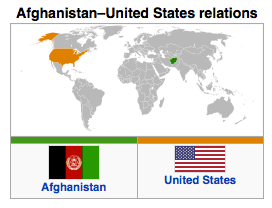Afghanistan: Operation Enduring ‘Fiefdom’ – Analysis
By IPCS
By J Jeganaathan
The US recently appointed James Cunningham and Richard Olson as ambassadors to Afghanistan and Pakistan respectively. Speculations are now rife about how are they going to shape the US end-game in the Af-Pak region. The appointments occurred in the final phase of the US war in Afghanistan, codenamed ‘operation Enduring Freedom’. Predictably, these two envoys will be instrumental in shaping the US’ role at this crucial juncture.
All the same, both of them have daunting tasks ahead during such difficult times. For Cunningham, the big task is three-folds: manage a face-saving exit, ensure the survival of the Afghan government and stability in the country after 2014, and keep the regional powers vying for strategic depth at bay. Olson’s task seems more trying as he has to deal with the fickle ally, Pakistan. For Oslon, the key priority will have to be to make Pakistan accountable for US aid and responsible for uninterrupted logistics supply to Afghanistan.

Both the envoys have emphasised the need to engage with Pakistan on issues concerning American interests in Afghanistan in particular and the region in general, but the onus to restore US-Pakistan relations that dipped to an all time low recently also lies largely on the latter. Simultaneously, identifying Pakistan as a crucial ally in the US-led war on terror has become an oxymoron in the US strategic circle, which is cognisant of Pakistan’s covert support to insurgencies. Yet, a genuine cooperation with Pakistan is a prerequisite for the stability of Afghanistan.
Uncomfortable Déjà Vu for US
The current politico-security situation in Afghanistan is a grim reminder of the past. The US, which is leading the International Security Assistance Force (ISAF) under the rubric of NATO, is experiencing an uncomfortable déjà vu in Afghanistan, playing the role previously exhibited by the Soviet Union. Reminiscent of the Soviet Union in the late 1970s, US is losing ground to Afghan insurgents or the so-called ‘Mujahideens’, covertly supported by the Pakistan military/ISI.
Just like the People’s Democratic Party of Afghanistan-led government headed by the then President Mohammad Najibulah, which survived only because of Soviet military and economic aid, the current government led by President Hamid Karzai is being sustained through US support. But unlike the Soviet Union, the US wants a decent exit from the country, leaving the combat missions to an incompetent Afghan National Army (ANA) ostensibly continuing to work for a stable and secure Afghanistan.
In the past, at the time of the Soviet withdrawal, The Wall Street Journal had deftly named Ahmad Shah Massoud- a prominet mujahideen – ‘the Afghan who won the Cold War’. It will be interesting to see which Afghan is going to earn the odes for driving the US out now? Three possible Afghan candidates worth consideration could be Mullah Mohammed Omar, Gulbuddin Hekmatyar and Jalaluddin Haqqani. And whether a civil war like situation would be exacerbated once the external support is pulled off would largely depend on the outcome of the games being played between the sub-national actors and the West-backed Karzai government. Such a possibility cannot be ruled out; rather it seems imminent.
Afghan Game of Thrones
Internally, the country is witnessing a huge scramble for dominance amongst different ethnic groups who are asserting their ethno-political identity. Though more than 20 warring groups are participating in the ongoing conflict, only the above-mentioned trio have the potential to play a larger role and can act as spoilers to the foreign-backed government in Afghanistan.
At the same time, the resilient Taliban is preparing ground for the ultimate overthrow of the Karzai government soon after the withdrawal in 2014. The startling reality is the fragile ANA and corrupt Afghan National Police (ANP) which instead of defending the nation from these ultra-fundamentalist forces, are defecting to the Taliban and other factions.
It appears for now, Mullah Mohammad Omar, the Amir al-Mu’minin is gaining control in the South and is likely to capture Kandahar. The eastern front is, however, dominated by the Islamic hard-liner, Gulbuddin Hekmatyar and the Haqqani network led by Jalaudding Haqqani. Hekmatyar remains the only Afghan resistant who is willing to negotiate power-sharing with the government and also not enjoy full confidence with Taliban as well as the Haqqanis
Apparently, these competing groups are being covertly supported by the ISI by means of providing ‘shelter and shells’, aimed at deepening Pakistan’s strategic influence in Afghanistan. However, the growing trust-deficit between the Taliban and Pakistan has driven the latter to switch allegiance to the Haqqani network.
Divide and Rein Strategy
In sum, the US-UK-Afghan joint-military mission codenamed ‘Operation Enduring Freedom’ in Afghanistan has now turned out to be an ‘operation enduring fiefdom’. Exhausted by a military strategy of alienation as well as a political strategy of reconciliation and reintegration, the West has chosen a ‘divide and rein’ strategy for better payoff which involves: talking to the Taliban, taming the Haqqani network and tempting Gulbuddin Hekmatyar for power-sharing. With no immediate end in sight, the US continues to rein the country by all means.
J Jeganaathan
Research Officer, IPCS
Email: [email protected]
